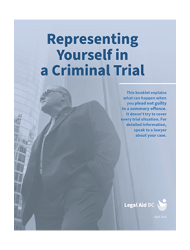A document called the Information is the official court form listing your charge (offence) and the date and place it allegedly happened. It may contain more than one charge. The offence you’re charged with may be different from what the police told you when you were arrested, and there may be more charges than what the police told you. In criminal cases, the Crown prosecutor (also called The Crown) decides what you’re charged with.
Make sure you understand what kind of offence(s) you’re charged with, and what the likely sentence will be (see How can I get information about my case? to find out how to get the disclosure).
A summary offence is a less serious offence. You can sometimes be considered for alternative measures for these types of crimes. (This means you may be able to avoid going to trial and won’t have a criminal conviction. See Can I avoid getting a criminal record? for more details). The penalty for most summary offences is up to two years less one day in jail and/or up to a $5,000 fine.
Note: If you’re charged with a summary offence, the Information needs to be sworn within one year of the date of the offence. If it isn’t, ask the judge to dismiss the case at your trial.
Indictable offences range from theft of more than $5,000 and break-and-enter to robbery, aggravated sexual assault, and murder.
If you’re convicted of theft of more than $5,000, you could be sentenced to up to 10 years in prison. Robbery or aggravated sexual assault could mean up to life in prison. The minimum penalty for certain offences involving the use of a firearm, even for the first offence, may be up to five years in jail in some cases. A conviction on a first-degree murder charge carries a mandatory minimum sentence of life in prison with no chance of parole for at least 25 years.
Note:“Hybrid” offences are ones that can be dealt with as either summary or indictable offences. If you’ve been charged with a hybrid offence and you hear that the prosecutor is planning to treat your crime as an indictable offence, get legal help immediately (see Where can I get legal help?).
